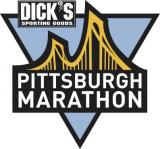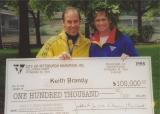|
|
Remarkable Run By Keith Brantly In Pittsburgh Was Worth $100,000 - RRW
Published by
May 1st 2020, 1:41pm
REMARKABLE RUN BY BRANTLY IN PITTSBURGH WAS WORTH $100,000
By David Monti, @d9monti
(c) 2020 Race Results Weekly, all rights reserved - Used with permission.
(01-May) -- Twenty-two years ago this Sunday Olympian Keith Brantly won the USA marathon title at the UPMC Health System/City of Pittsburgh Marathon. In a mostly solo run on a rainy and humid day Brantly, then 35, clocked the fastest time ever by an American on Pittsburgh's hilly course, 2:12:31, a lifetime best. He would never run a faster marathon, and retired from competitive running two years later.
But more importantly through the magic of marketing, clever thinking by a race director, and an overly generous specialty insurance company, race organizers presented Brantly with a winner's check of $100,000. At the time, that equaled the largest ever "above-the-table" marathon payday for an American man (Bob Kempainen also earned $100,000 in prize money for winning the 1996 Olympic Trials). In today's dollars, Brantly's payment was worth $158,000, more than the $150,000 given to the 2019 Boston Marathon winners, the highest first-place payday in marathon running today*.
Why was the check so big? The story began with then-race director Larry Grollman. A sports trainer with an MBA, Grollman was in his second year of race directing, his side job at the University of Pittsburgh Medical Center. A big man with a deep voice, Grollman didn't know much about running, but understood marketing and promotion better than many veteran race organizers. I was his race consultant at the time.
"What do you think about doing some kind of bonus?" Grollman asked me in a telephone call several months before the race. He said he had another $5,000 to spend on race promotion and was looking to further hype-up the National Marathon Championships for men that the race was hosting. I said that I would think about it and get back to him.
I happened to know about a specialty insurance company which covered all kinds of one-off risks like holes in one at golf tournaments and half-court shots by fans at basketball games. Maybe they would be willing to insure a marathon bonus?
For a bonus to be an effective promotional tool it has to be difficult, achievable, and sufficiently large. Offering a bonus for, say, a world record would make little sense for a USA championships on a hilly course, and even the American record at the time (2:09:21 by Alberto Salazar from Fukuoka in 1983) was too far out of reach. The 1995 course record of 2:10:24 by Kenya's John Kagwe was a possibility, but was still a little stiff; American men's marathon running wasn't as strong then as it is today.
I did a little digging and determined that the fastest time ever by an American at Pittsburgh was 2:12:57 by Ken Martin in 1985. That was challenging mark, but potentially doable. I presented the idea to Grollman, he liked it, and I put him in touch with the insurance company. I thought maybe the company would be willing to offer a $25,000 bonus for a premium payment of $5,000.
A few days later, Grollman called me back and said that the insurance company representative told him they were willing to do a $100,000 bonus for a $5,000 premium. He asked what I thought of that, and I was astonished. Just five cents on the dollar!
"I remember saying to you that I want to fly down to Dallas with the check first thing tomorrow morning so they do not have a chance to change their minds," Grollman recalled last week in an e-mail message to Race Results Weekly.
The contract was signed, the elite field was recruited, and the bonus was promoted heavily. Brantly decided to join the field after a dissatisfying 1997 campaign, a big letdown after he finished third at the 1996 Olympic Trials Marathon and was the top American finisher in the 1996 Olympic Marathon (28th place).
"Part of my focus for Pittsburgh came out of a frustrating issue in 1997," Brantly recalled in a recent e-mail message. "While training for the Chicago Marathon in the summer of 1997 I hurt my hamstring on the last interval of my last hard workout. Hoping that some rest helped my hamstring, I coasted into Chicago but dropped out at 7.5 miles because my hamstring was so sore."
Race day came along and Grollman didn't know if any of the athletes would go for the bonus, but we wanted to give them a good chance. He had hired Peter De La Cerda as a pacemaker (he called him "Peter Rabbit"), and De La Cerda took the field through 10 miles in 49:53, sub-2:11 pace. Four men were in the lead pack behind De La Cerda: Brantly, Scott Larson, David Morris and Alfredo Vigueras, the defending champion. The record was still in play, but the toughest sections of the course were still to come.
Late in the 11th mile, Brantly made his move. The 12th mile has the longest and steepest uphill on the course and Brantly smoked it in 4:58, dropping all of his rivals. It looked like a foolish move considering the rainy and humid conditions, but Brantly was confident, at least then.
"I was sure I could get the record," he said that day. "I'm just a good hill runner."
A few miles later Brantly's right hamstring started to bother him, and he repeatedly reached down grabbing the back of his right leg. His face seemed to tighten up and he was in obvious pain. The slick roadway was apparently aggravating the problem.
"I felt my hamstring tighten up," he said, "but it wasn't that bad. It was more of a twinge. It started to get a little slick, and that's bad for your hamstrings."
The race was on live, local television and the announcers were talking about Brantly's progress against the record. Pittsburghers who wouldn't normally care about the marathon began to come out of their homes to cheer him on. The rain intensified and Brantly's black New Balance uniform was soaked to his skin. He was still on track for the record, but it was going to be close.
"I didn't dare look back," he said.
More spectators came out chanting his name, "Keith! Keith!" Brantly was hurting, but determined.
"I felt like I had a million people running with me out there," he said.
Brantly took a head of steam from a 4:53 downhill 22nd mile and pushed to the finish line in Point State Park in 2:12:31. He beat the record by 26 seconds, won the $100,000, and became a minor local legend. The story was so big at the time that it even got picked up by the New York Times (with a photo), unheard of for a regional marathon especially in the era before social media.
"I know so many people here in Pittsburgh on a first name basis that I might run for mayor," Brantly joked right after the race.
Weeks later Grollman confirmed that the insurance company had paid the bonus, and Brantly would get the money. But things didn't go so well for the company's representative who sold the policy.
"When I called the company a few months after they said he was no longer working there," Grollman recalled.
Looking back, Brantly said he really wasn't all that confident that day.
"When I arrived in Pittsburgh I knew we had a good crew of runners but I really didn't think I had a chance to get the bonus," he recalled. "I think my PR of 2:12:51 from NYC in 1993 was the time to beat at Pittsburgh to get the record, so it was going to be a long-shot. As it turned out, I think NYC was a much tougher course than Pittsburgh."
Twenty-two years later only two other American men, Khalid Khannouchi and Meb Keflezighi, ever earned as much in prize and bonus money for a marathon performance. Khannouchi earned $255,000 for his world record run in London in 2002 (2:05:38), and $175,000 for his Chicago Marathon win later that year (2:05:56). Keflezighi earned $115,000 for his second place finish at the TCS New York City Marathon in 2004 (2:09:53), and $200,000 for his win at the same race in 2009 (2:09:15) when it was also the national championships. Keflezighi also won $150,000 in prize money for his Boston Marathon victory in 2014.
* * * * *
The 2020 Dick's Sporting Goods Pittsburgh Marathon was to be held this Sunday, but was cancelled due to the COVID-19 pandemic. However, many runners are competing in the event remotely. Roberta Groner, who finished sixth at last year's World Athletics Championships marathon will be doing just that, raising money to purchase protective "buffs," essentially fabric tubes worn around the neck or face, for healthcare workers (Groner is a nurse). Those wishing to contribute to her efforts can do so here: https://www.gofundme.com/f/keep-fearlessly-goingkfg
____________
*Prize money, only; not including any time bonuses or appearance fees
PHOTO: Keith Brantly with his late coach, Dr. David Martin, after winning the 1998 Pittsburgh Marathon and collecting a special $100,000 bonus (photo courtesy of Keith Brantly)
|









